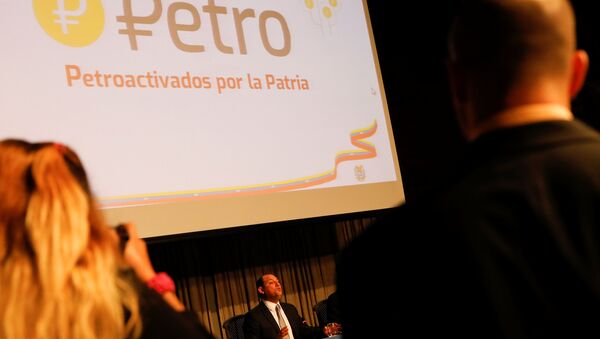Sputnik: In your view what consequences will this new cryptocurrency have on the oil market?
David Coker: Any impact on the oil market would be, we'd have to look at the convertibility of the Petro, and by that I mean if I hold the Petro, if I buy it, can I later convert it for oil — and more importantly, if I got oil, can I convert that for Petros? If look at it this way, we sort of view it as an exchange traded fund, if there is convertibility, it would have an impact, if there is no convertibility it won't have any impact at all.
Sputnik: What impact can this have on Venezuela's deep economic and political crisis? At the moment, is there going to be some correlation with the thoughts that the Venezuelan government are hoping to sow?
David Coker: Well, they are desperate to raise money. We know foreign direct investment has cratered and in some quarters has even gone negative, meaning money is fleeing the country. They're clearly desperate to raise money to evade United States controls. I don't think this is going to have any more than a short term impact. To raise $700million, we have to see how far it goes.
READ MORE: Venezuela's Cryptocurrency Raises $735Mln, to Be Used in Oil Trade
Sputnik: Now Venezuela's vice president said that Petro would generate confidence and security in the national and international markets. Is this likely to be true?
David Coker: Well, sir, I really would have to disagree with the gentlemen. Again, until we get answers to the convertibility. Can I present oil and receive Petros? Or can I take Petros and convert them to oil? We won't really see any confidence or security. In fact it might have the opposite effect and it may be viewed very negatively in that Venezuela is just trying to do another, what is called an initial coin offering, and by doing so take a lot of money and then fail to deliver.
READ MORE: Venezuela's Maduro Announces Another Cryptocurrency, Now Gold-Backed
Sputnik: What's your take, then on cryptocurrency generally? Do you think that it can become a potential player in the cryptocurrency market? Is there going to be some kind of new order for Venezuela, is it going to lead it out of this mess that the country is in and are we going to continue to see growth in interest in cryptocurrency? Because we know Bitcoin is going up and down like a yo-yo: it was like $6,000 last week, now it's back to $11,000. Depending on the day of week, people are saying it is never going to come back, and then the next day it's going to go to 20,000. What's your take on it?
David Coker: Well, I heard people say a 100,000, but it's not my prediction. In general, the whole idea, the underlying technology is extremely useful, and we are seeing countries like Estonia, for instance, they are undertaking the whole national identity project based upon blockchain, the underlying technology. I do think cryptocurrencies have a future. I'm not convinced Bitcoin, the current "poster-child" as you mentioned, is the one. There are a lot of negatives associated with Bitcoin and not the least of which is the euphoria, to use your phrase, that surrounds some of the people who "invest" in this asset. They don't invest, it's speculative. So I do see a future in another form Bitcoin. We do know that most of the central banks, of western nations are experimenting with cryptocurrencies. Canada, for instance, is very upfront — they have got their own cryptocurrency. The Bank of England has made allusions to it, I'm sure the US has got some ideas on it as well. So they are extremely useful, it's just I don't see it with Venezuela. They are just trying to grab some money from investors globally. And they are trying to evade US's controls, as fair or unfair as those currency controls and sanctions may be.
READ MORE: In Venezuela's Footsteps: Iran Mulls Own Cryptocurrency Amid US Sanctions
Sputnik: Do you think this move will let Venezuela avoid the negative impact that US sanctions are having on the country? Obviously the US sanctions that were initiated 6 months ago or so are having some kind of effect. What's your opinion on this?
David Coker: Well, I don't think so. It's really not enough. Their need for capital is ongoing and very, very large what they have currently raised and indeed what they have forecasted to raise… and one of the things to keep in mind is that people tout the anonymity of cryptocurrencies and they absolutely are not. The US, again for better or worse, has very strict controls over the global financial system. When money enters the system to be diverted to a cryptocurrency, that is traceable and you don't need state level security any longer to do this. I always invite people to google "Bitcoin Detective." And you see, there are actually private firms that, if you lose your Bitcoin for whatever reason, they will trace it down for you. So I don't see this as having a long term effect. It will be more or less what we call a "sugar rush" — it will be a short-term impact and there will be a lot of noise and then the crowd, that chases this ICOs or initial coin offerings, will be after the next big thing.
The views expressed in this article are solely those of David Coker and do not necessarily reflect the official position of Sputnik.

